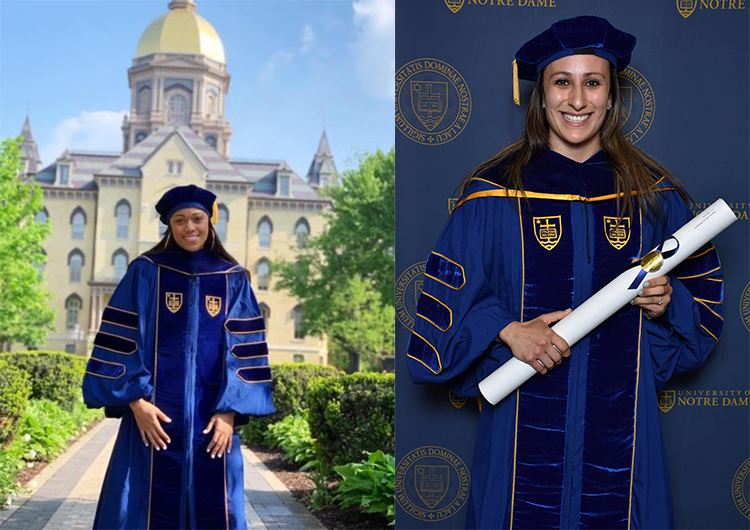Holding Court: Former UTEP Women's Basketball Stars Begin Law Careers
Last Updated on August 01, 2019 at 12:00 AM
Originally published August 01, 2019
By Pablo Villa
UTEP Communications
As former standouts for The University of Texas at El Paso's women's basketball team, Cameasha Turner and Marissa Rodriguez recognize the importance of court awareness.

Transitioning from offense to defense, properly executing a pick-and-roll, and taking high-percentage shots are all innate actions for the pair of phenoms who together were part of some of the most notable teams in Miner history including the squad that reached the 2014 Women’s postseason National Invitation Tournament final.
But years removed from the confines of the Don Haskins Center, the duo are honing court awareness in a different manner. In May 2019, Turner graduated from the University of Notre Dame Law School. That same weekend, Rodriguez — who matched the feat of her former teammate at Notre Dame a year earlier — received her Master of Laws in Taxation degree from Northwestern University’s Pritzker School of Law.
Their accomplishments mark the culmination of journeys where they dealt with demanding schedules and formidable curriculum. Both are pleased to have reached this juncture in their academic careers and agree that they built the fortitude to prosper in grueling environments at UTEP.
“Graduating from Notre Dame was one of the biggest moments of my life,” said Turner, the Miners’ top scorer during the 2014-15 season. “But I think one of the things I am most proud of is just continually staying the course. There were so many times throughout my life, even at UTEP, where I had to learn a lot of lessons. UTEP has literally been the springboard to get me where I am today.”
Turner, who earned her bachelor’s degree in criminal justice from UTEP in 2016, enjoyed an elevated distinction during her final season. The NCAA included the Dallas native among the finalists for its 2016 Woman of the Year Award, which recognizes women whose collegiate careers are highlighted by achievements in academics, athletics, community service and leadership. With her time at Notre Dame complete, Turner is back in Texas preparing for the state bar exam and a position at Locke Lord, a Dallas law firm, where she will begin work in September.
Rodriguez, an El Paso native who went to high school in San Antonio, said she was pleased to be part of some of the most special seasons in UTEP women’s basketball history. Among her favorite memories are being part of the Miners squad that qualified for the NCAA tournament her freshman year, and the raucous crowds that filled the Haskins Center in 2014 during the NIT Final Four.
But she also was elated to share a path through UTEP’s College of Business Administration with her father, who previously graduated with his Master of Accountancy. Rodriguez received her bachelor’s degree in 2015, and that interest in accounting spurred her to pursue specialization after completing her law degree at Notre Dame in May 2018. With her time at Northwestern complete, she has passed the Wisconsin state bar and began work in July at KPMG in Milwaukee.
“My time at UTEP helped me focus on what I wanted to go do in life,” Rodriguez said. “Law school is not just the three years you spend on campus. It is the years preparing for it, too. So there has been a lot of stress and anxiety for the past six or seven years. So, finally, when you walk across that stage and get that diploma, it’s, like, ‘Wow, I actually did this!’”
Both women express considerable gratitude for their head coach, Keitha Adams, whom they said stewarded their athletic success and academic endeavors. Turner and Rodriguez also lauded the Law School Preparation Institute (LSPI) at UTEP’s Patti and Paul Yetter Center for Law for setting them on a path to Notre Dame.
“We immerse UTEP students in a law school type experience,” said Brent McCune, assistant director of the Yetter center. “From reading case law and being exposed to the Socratic method of teaching, to learning and practicing legal writing and analysis, students develop and refine skills critical to success in law school. We also provide rigorous training for the LSAT exam, which remains the most important piece of, and perhaps the biggest hurdle to, law school admission. The institute demands a lot from UTEP students and it is always great to see the students rise up and meet the challenge.”
The University initiated the LSPI College Summer Program in 1998 to help prospective law students develop critical thinking skills and study habits, and to guide them through their law school applications. The program presents students with a rigorous workload that focuses on academic thinking skills that are necessary to succeed in law school. The LSPI is open to UTEP undergraduate students of any major.
“It was the institute that spurred my interest in law school,” said Rodriguez, who started her time at UTEP in the College of Liberal Arts before switching her major to accounting. “The immersion program I took part in was tremendous. They gave me the tools, they polished my application, they just overall helped me focus on where I wanted to go in life.”
Turner adds that other classroom experiences as an undergraduate along with support from the Miner Athlete Academic Center were instrumental in her advancement. She said she hopes to give back to the UTEP community one day.
“UTEP taught me the importance of being a family,” she said. “I understood that utilizing and engaging with the support systems available on campus is very important. We’re family. We keep this together. We continue to provide for each other through resources in whatever way that is, whether it’s money, whether it’s coming back and speaking, whether it’s putting on an event, or mentoring a UTEP student.”